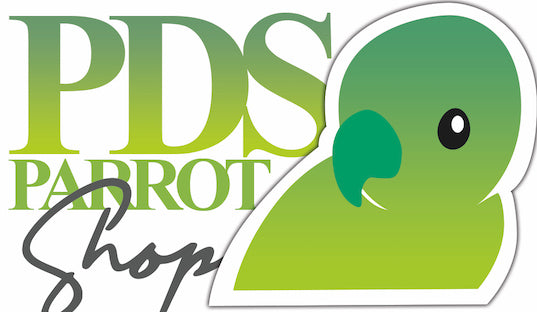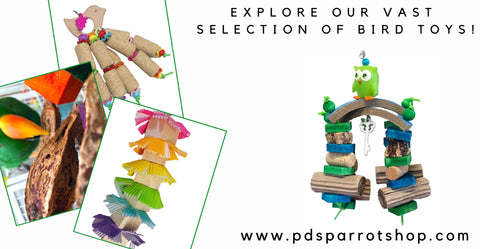
Holiday Hazards For Birds: Keep Your Parrot Safe
Share
The holiday season is a time for celebration, but it also brings hidden dangers for our pet birds. With festive decorations, new foods, and guests filling your home, it's easy to overlook hazards that could put your pet bird at risk. Protecting your bird during this busy season requires extra precautions. Here’s how to keep your parrot safe and happy throughout the holidays! This is a special holiday addition of hazards, for toxic respiration hazards please read: Toxic Respiration Hazards for birds.

Holiday Plants Could Be Toxic to Pet Birds
Fresh Christmas Trees comes with Hazards: Real trees are often treated with pesticides and may have been given fertilizers that can be harmful to your parrot.
Monitor Tree Water: If you have a live tree, be cautious about the water in the tree stand. Chemicals from the tree, as well as additives in the water, can be toxic. Cover the tree stand to prevent your parrot from drinking the water.
Mindful of Holiday Plants: Some popular holiday plants, like poinsettias, mistletoe, and holly, can be toxic to parrots if ingested. Keep these plants out of reach or consider choosing bird-safe alternatives.
List of toxic holiday plants:
- Chrysanthemum
- English Ivy (Hedera helix)
- Holly (Ilex spp.)
- Mistletoe (Viscum album)
- Poinsettia (Euphorbia pulcherrima)
- Yew (Cephalotaxus sp.)

The Dangers of Holiday Decorations with Pet Birds
Avoid Tinsel and Artificial Snow: Both tinsel and artificial snow can be enticing for parrots but are hazardous if ingested. Tinsel can cause digestive issues, and artificial snow may contain harmful chemicals. Curious beaks may chew on ribbons or tinsel, which can cause intestinal blockages.
Secure Ornaments and Lights: Parrots are curious and may try to explore the decorations on the tree. Make sure ornaments are securely fastened, and keep ornaments away from birds as they may be made from cheap materials containing heavy metals. Keep an eye on your parrot to prevent them from chewing on ornaments and light cords.
Watch for Gift Wrapping Hazards: Wrapping paper, ribbons, and bows can be tempting for parrots to chew on. While wrapping gifts, keep these items out of your parrot's reach, and dispose of any small pieces promptly to prevent accidental ingestion.
Be Cautious with Candles and any scented decorations: If you use candles for decoration, be mindful of your parrot's proximity to open flames. Parrots are naturally curious, and a burning candle could pose a fire hazard. Certain oils found in candles, potpourri, and scents are harmful to your birds. You may always boil fresh herbs like cinnamon, cloves, and mint to create a pleasant aroma throughout your home.
Stress Management During Holidays
Maintain a Routine: The holiday season often brings changes to routines and increased activity. Parrots thrive on routine, so try to maintain a consistent schedule for feeding, playtime, and sleep to minimize stress
Provide Quiet Time: Parrots can become overwhelmed by the hustle and bustle of holiday gatherings. Ensure your parrot has a quiet place where they can retreat if the festivities become too much for them.

Pin Me
Holiday Guests and Safety Management
Check for Escape Routes: With doors opening and closing frequently during gatherings, be cautious about your parrot's proximity to entrances. Check that windows and doors are secure to prevent accidental escapes.
Educate Visitors: If you have guests over, especially those who may not be familiar with bird safety, politely inform them about the precautions needed when visiting your home. This can help create a bird-friendly environment during social gatherings.
Discourage Pet Visitors: Encourage visitors not to bring dogs or other pets into your house. If an unfamiliar animal does happen to enter your home, keep it far from your pet and be on the lookout because predatory impulses can strike at any time.
Emergency Preparedness: Familiarize yourself with the location and contact information of an avian veterinarian in case of emergencies. Have a basic first aid kit for your parrot and know the signs of distress or illness.
Toxic Holiday Cooking Items to Keep Away from Birds
Avoid Non-Stick Everything: Non-stick coatings can emit fumes when overheated, which can be harmful to birds. Make sure to use low to medium heat when cooking with non-stick pans and never leave them unattended on a hot stove. This includes pots and pans, non-stick foil etc.
Avoid Roasting Bags: Roasting bags can smoke, melt and burn, causing fumes which is toxic to birds.
Be Cautions about Cooking: Confine your pet bird to its cage to prevent accidents with pots of boiling water and pans of frying food. Use proper ventilation when doing any type of cooking to ensure that any potential fumes are quickly dispersed, reducing the risk of exposure for your parrot.
Be Mindful of Food Sharing: While it's tempting to share holiday treats with your parrot, not all human foods are safe for them. Avoid giving them foods with high salt, sugar, or caffeine content. Stick to bird-safe treats and fresh fruits and vegetables.

Dangers of Holiday Cleaning with Pet Birds
Choose Bird-Safe Cleaning Products: Many common household cleaning products contain chemicals that can be harmful to birds. Use bird-safe or natural cleaning alternatives to reduce the risk of toxic exposure. Vinegar, baking soda, and diluted mild dish soap are often safer options.
Cautions about Shampooing your Carpet: If you use carpet cleaners, be aware that the fumes and residues can linger. Follow the manufacturer's instructions, and allow sufficient time for the area to ventilate before reintroducing your parrot.
Cautions of Kitchen Appliances for Pet Birds
Avoid Non-Stick Heaters: Some space heaters come with non-stick coatings or emit fumes when heated. Choose heaters with bird-safe materials, and ensure they don't produce any harmful fumes that could affect your parrot's respiratory health. Recommendations are ceramic heaters or radiant/oil filled heaters.
Mindful of Hot Surfaces: Parrots are curious creatures and may want to investigate the cooking area. Be cautious about hot surfaces, boiling water, crockpots, and open flames. Keep your parrot at a safe distance and ensure they are secure in their cage or a bird-friendly designated area.
Cord Management: Keep cords neatly organized and secured to prevent them from hanging down where your parrot can reach. Use cord organizers, clips, or covers to bundle and manage cords, minimizing their accessibility to your curious bird.
Remember that every parrot is unique, so observe your bird's behavior and adjust your precautions accordingly. By taking these steps, you can help ensure a safe and joyful holiday season for both your family and your bird! Happy Holidays!
Keeping your birds healthy, inside out.
Vitamins support everything from metabolism to neurological function in birds. A clear understanding of vitamin deficiencies in birds and their early indicators supports proactive, informed care rather than reactive treatment.
Images: Banana, cockatoo. Krishna, eclectus.
Monika Sangar, MSc – Molecular Biology | Avian Nutrition Specialist | Founder: PDSnonprofit | Owner: Pds Parrot Shop
Monika Sangar is a parrot rescuer, bird food chef, and toy designer with over a decade of experience in avian care and nutrition. She is the founder of Prego Dalliance Sanctuary and the author of The Science of Avian Nutrition, a cookbook dedicated to fresh, healthy meals for parrots. Explore more bird care tips and bird toys at PDS Parrot Shop!

